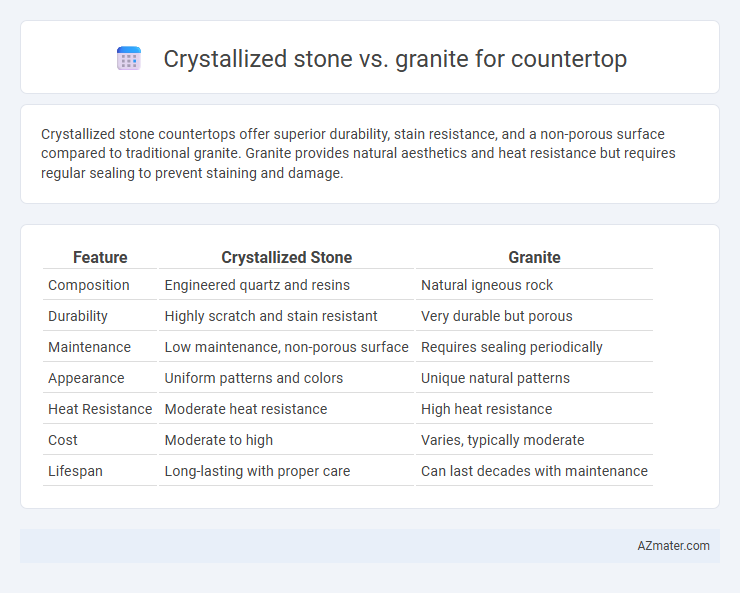Crystallized stone countertops offer superior durability, stain resistance, and a non-porous surface compared to traditional granite. Granite provides natural aesthetics and heat resistance but requires regular sealing to prevent staining and damage.
Table of Comparison
| Feature | Crystallized Stone | Granite |
|---|---|---|
| Composition | Engineered quartz and resins | Natural igneous rock |
| Durability | Highly scratch and stain resistant | Very durable but porous |
| Maintenance | Low maintenance, non-porous surface | Requires sealing periodically |
| Appearance | Uniform patterns and colors | Unique natural patterns |
| Heat Resistance | Moderate heat resistance | High heat resistance |
| Cost | Moderate to high | Varies, typically moderate |
| Lifespan | Long-lasting with proper care | Can last decades with maintenance |
Introduction to Crystallized Stone and Granite
Crystallized stone, an engineered material made from natural minerals fused under high temperature and pressure, offers superior durability, stain resistance, and a non-porous surface ideal for countertops. Granite, a natural igneous rock known for its unique patterns and heat resistance, requires periodic sealing to maintain its appearance and protect against staining. Both materials provide robust options for kitchen and bathroom countertops, with crystallized stone offering a more consistent, low-maintenance finish compared to granite's natural variability.
Composition and Formation Processes
Crystallized stone countertops are engineered from natural aggregates mixed with resins and pigments, resulting in a non-porous, uniform surface that mimics natural stone. Granite forms through the slow crystallization of magma beneath the Earth's surface, creating large, interlocking mineral crystals primarily composed of quartz, feldspar, and mica. The man-made composition of crystallized stone allows greater control over color and pattern consistency, while granite's natural formation yields unique variations in texture and mineral distribution.
Visual Appeal and Aesthetic Differences
Crystallized stone countertops offer a sleek, uniform surface with consistent coloring and subtle transparency that enhances modern kitchen designs, contrasting with granite's distinctive, natural veining and speckled patterns that add a rustic or traditional charm. Granite features a wide range of unique color variations and textures due to its natural mineral composition, making each slab one-of-a-kind, whereas crystallized stone provides a more polished, engineered look with greater color consistency. The choice between crystallized stone and granite hinges on desired aesthetic impact: crystallized stone for a smooth, contemporary appeal and granite for organic, varied beauty.
Durability and Hardness Comparison
Crystallized stone countertops exhibit superior durability with enhanced resistance to scratches, stains, and heat due to their dense, non-porous surface compared to granite. Granite, while naturally hard and durable with a Mohs hardness rating typically between 6 and 7, is more prone to chipping and requires regular sealing to maintain its integrity. The crystallized stone's engineered composition offers consistent hardness and minimal maintenance, making it a more resilient choice for high-use kitchen environments.
Maintenance and Cleaning Requirements
Crystallized stone countertops offer superior resistance to stains and scratches, requiring minimal maintenance compared to granite, which needs regular sealing to prevent damage. Cleaning crystallized stone is straightforward with mild soap and water, while granite demands specialized cleaners to preserve its seal and avoid surface degradation. Both materials benefit from prompt spill cleanup, but crystallized stone's non-porous surface significantly reduces the risk of bacteria and mold buildup.
Stain and Heat Resistance
Crystallized stone countertops offer superior stain resistance due to their non-porous surface, preventing liquids from seeping and causing discoloration. Granite, while naturally heat resistant, can withstand high temperatures but may absorb oils and stains if not properly sealed. Both materials require maintenance, but crystallized stone generally provides easier upkeep against stains and sustained heat exposure in kitchen environments.
Design Versatility and Customization
Crystallized stone countertops offer exceptional design versatility with a wide range of colors, patterns, and finishes that can be easily customized to fit modern and traditional aesthetics. Granite provides a natural, unique veining and coloration for each slab, making every countertop one-of-a-kind but with more limited customization options compared to engineered crystallized stone. Both materials allow tailored edge profiles and dimensions, but crystallized stone's engineered composition enables more precise shapes and intricate designs for personalized kitchen and bathroom spaces.
Environmental Impact and Sustainability
Crystallized stone countertops are often manufactured using recycled materials and byproducts, reducing landfill waste and promoting resource efficiency. Granite, being a natural stone, requires extensive quarrying that disrupts ecosystems and depletes finite resources. The energy consumption in producing crystallized stone is generally lower compared to the heavy machinery and transportation involved in granite extraction, making crystallized stone a more sustainable choice for environmentally conscious homeowners.
Cost Comparison and Value for Money
Crystallized stone countertops typically cost between $50 to $150 per square foot, offering a mid-range option compared to granite, which ranges from $40 to $100 per square foot depending on quality and source. Crystallized stone provides superior durability and resistance to stains and scratches, often justifying its higher price through long-term value and minimal maintenance. Granite remains popular for its natural beauty and variety, but crystallized stone's enhanced performance and consistent appearance deliver better investment potential for homeowners seeking longevity and aesthetic appeal.
Choosing the Right Material for Your Countertop
Crystallized stone offers superior durability and non-porous surface properties, making it highly resistant to stains and scratches, which is ideal for busy kitchens. Granite provides unique natural patterns and heat resistance but requires regular sealing to maintain its longevity and prevent staining. Selecting between crystallized stone and granite depends on your preference for low maintenance and durability versus natural aesthetics and traditional appeal.

Infographic: Crystallized stone vs Granite for Countertop
 azmater.com
azmater.com